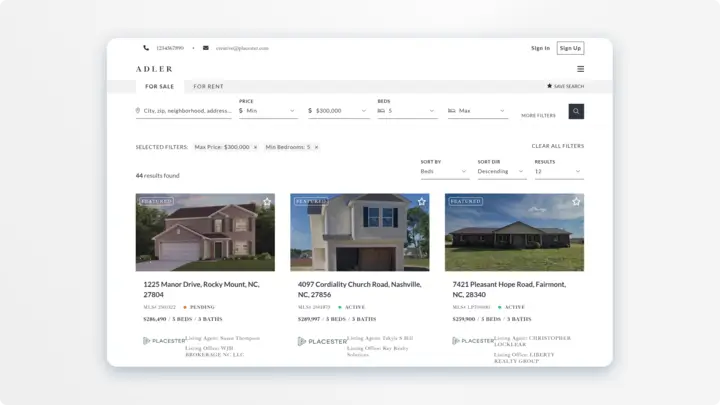IDX stands for “Internet Data Exchange,” a standard used in real estate to facilitate the display and exchange of property listing information on websites. The software adds Multiple Listing Service (MLS) on real estate websites, allowing potential buyers to search for properties directly from the agent’s site. The listings are updated every few hours, so your audience can always access the most recent listings and contact you for information about the available properties.
How does IDX work?
Real estate agents and brokers often connect to a local MLS database containing comprehensive information about properties available for sale or rent in a particular area. This information includes property features, photos, prices, and contact information for the listing agent. IDX software allows agents to integrate this MLS data into their own websites. Integration can be accomplished through various methods, such as pre-built IDX plugins or APIs. Once integrated, the agent’s website can display the MLS listings, providing visitors with a user-friendly interface to search for properties based on criteria like location, price range, property type, and more.

When visitors click on a property listing, they are shown detailed information about the property, including photos, descriptions, and contact information for the listing agent, so they can follow up.
Why do you need an IDX real estate website?
Is having an IDX feed on your website always right for you? The answer is not quite as simple as “yes” or “no.” Instead, the answer is more along the lines of “it depends.”

YES to an IDX
IDX greatly benefits agents and brokers who want a comprehensive website because it enhances the user experience. Integrating IDX is a reasonable choice if your website provides property search functionalities. Buyers or sellers don’t necessarily need to understand the technical aspects of IDX. However, websites with IDX integration offer a more streamlined and accurate search experience when browsing for properties, as you directly access MLS data.
Benefits of using IDX on your website:
- Property search: IDX allows visitors to search for properties directly on your website. When visitors actively search for properties, they will likely be interested in buying or selling. By providing an easy-to-use property search feature, you can attract potential clients.
- User registration: To access advanced features of the IDX search, such as saving searches, setting up property alerts, and viewing detailed property information, visitors often need to register on your website.
- Saved searches and alerts: When users save their searches and set up property alerts, the IDX system can send them notifications when new listings that match their criteria become available. This continuous engagement with your website keeps them connected and increases the chances of conversion.
- Lead capture forms: Apart from registration, you can strategically place lead generation forms on your website. For example, you can offer resources like ebooks, guides, or market reports in exchange for visitors’ contact information.
- Contact requests: Many IDX integrations allow users to request more information or schedule showings for specific properties. These contact requests provide you with direct leads interested in a particular property.
- Featured listings and calls to action: By showcasing featured listings prominently on your website and including clear calls to action (CTAs), you encourage visitors to inquire about those listings. These inquiries can turn into valuable leads.
- Drip email campaigns: Once you have captured leads through IDX registration or forms, you can set up automated drip email campaigns. These campaigns nurture leads over time by providing them with relevant content, property updates, and valuable insights.
- Social sharing and virality: Visitors might share your website with their networks if your IDX search is user-friendly and offers unique features. This can lead to faster growth and the capture of more leads. When you provide market insights, talk trends, and neighborhood information, it might become viral.
- Analytics and tracking: Many IDX systems provide analytics and tracking tools. By monitoring user behavior, you can identify which properties users are interested in and how they interact with your website and tailor your follow-up strategies accordingly.
The rules for using IDX
The National Association of Realtors (NAR) regulates the usage of IDX. However, there are some rules real estate professionals should follow when using IDX:
- You must have a seller’s consent to post their property listing in IDX.
- Listings must be approved for display by the MLS or listing broker before they’re featured on your site.
- Information in the listing, such as property features and dimensions, cannot be altered to appear more attractive to other agents and potential buyers, but listings on your website must be updated.
- If you prohibit your listings from being displayed in IDX, you cannot share other IDX participants’ listings on your site.
NO to an IDX
You are missing out on website traffic if you own a real estate website without IDX (and thus no property search option) and only upload your listings. However, not everybody needs a website integrated with IDX software.
If your website serves more as an online business card and is a part of your already recognized brand, you might skip an IDX. The same goes for:
- Single-agent websites: If you’re an individual real estate agent focusing on a specific niche or geographic area and have limited listings, you might not need an IDX. You can manually list the properties you represent on your website without a comprehensive IDX integration.
- Non-sales focus: If your website serves a broader purpose beyond just listing properties, such as offering real estate advice, market insights, or educational content, you might not need an IDX. Your website’s primary goal might be to provide information rather than listing properties.
- Off-market or exclusive listings: If you primarily deal with off-market or exclusive listings unavailable on the MLS, an IDX might not be necessary. In such cases, you can showcase your exclusive listings on your website without integrating with the MLS.
- Privacy or specialized niche: If you’re dealing with high-profile clients or specialized properties where privacy is a concern, you might choose not to use an IDX to limit the exposure of listings to a wider audience.
- Development or commercial real estate: If your website is dedicated to showcasing real estate developments or commercial properties, an IDX might not be relevant. These types of listings might not be part of the traditional residential MLS.
- Custom property management systems: If you have a custom-built property management system that you prefer to use for listing and managing properties, you might not need an IDX.
In Placester, IDX feed is part of your website and most of the pages are indexed in Google. You do not need to create a separate page to have it indexed, however, you can improve your website’s ranking even further by requesting a web page for each MLS listing.
It’s good to mention alternatives: real estate web portals like Zillow and Trulia don’t use IDX. They get their information from other sources, including brokerage syndication. You might find that the listings on these sites are often not as comprehensive or as up-to-date as IDX data.
TO IDX or NOT TO IDX?
Remember that the decision to use an IDX depends on your business model, goals, and the nature of your real estate activities. An IDX can be beneficial for most real estate professionals as it provides a convenient way to display up-to-date property listings. Still, there are cases where it might not be necessary or suitable. That’s why in Placester, IDX integration is now optional: you can have an IDX website or opt for a simplified, no IDX one (you can add it later on when the need arises).





